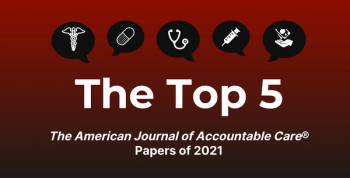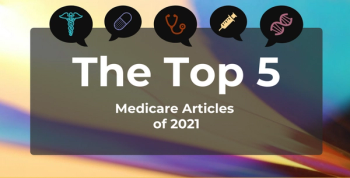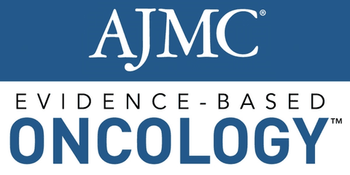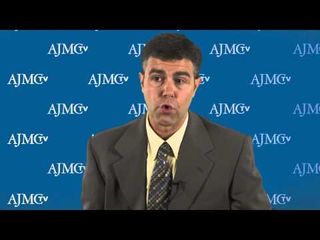
Health Care Cost
Latest News

Anthony Fauci, MD, said the CDC is considering changes to its guidance requiring a negative COVID-19 test after 5-day quarantine; bipartisan legislation banning surprise medical billing goes into effect; booster vaccine programs may be limiting global vaccine supply for low- and middle-income countries.
Latest Videos

CME Content
More News

This 8-part conversation with Blue Cross and Blue Shield of North Carolina and Newton Family Physicians, moderated by The American Journal of Managed Care® (AJMC®), focuses on the role of value-based care, independent care practices, and other aspects of health care that have been and continue to be affected by the continuing COVID-19 pandemic, even as we enter 2022. This is part 4.

This 8-part conversation with Blue Cross and Blue Shield of North Carolina and Newton Family Physicians, moderated by The American Journal of Managed Care® (AJMC®), focuses on the role of value-based care, independent care practices, and other aspects of health care that have been and continue to be affected by the continuing COVID-19 pandemic, even as we enter 2022. This is part 3.

AJMC® Conversations: BCBS NC and Newton Family Physicians—Impact of Value-Based Care on Primary Care
This 8-part conversation with Blue Cross and Blue Shield of North Carolina and Newton Family Physicians, moderated by The American Journal of Managed Care® (AJMC®), focuses on the role of value-based care, independent care practices, and other aspects of health care that have been and continue to be affected by the continuing COVID-19 pandemic, even as we enter 2022. This is part 2.

This 8-part conversation with Blue Cross and Blue Shield of North Carolina and Newton Family Physicians, moderated by The American Journal of Managed Care® (AJMC®), focuses on the role of value-based care, independent care practices, and other aspects of health care that have been and continue to be affected by the continuing COVID-19 pandemic, even as we enter 2022. This is part 1.

The most-read AJAC papers of 2021 analyze real-world programs to transform health care and provide insight into physician perspectives of health care and insurance.

This year’s most-read articles on Medicare covered topics including accountable care organizations, value-based payment, and star ratings.

A new study comparing intensive care unit stays among patients with Parkinson disease and controls without the disease found the former have more severe illness, but both groups have similar survival rates.

The editors of The American Journal of Managed Care® and The American Journal of Accountable Care® reflect on the past year and discuss the themes and topics they expect to see in 2022.

Anne Barmettler, MD, an associate professor of ophthalmology, visual sciences, and plastic surgery at Montefiore Medical Center, discusses the cost of teprotumumab for thyroid eye disease.

Interest in the use of digital inhalers is growing, as they may provide real-world evidence about how patients monitor and treat their chronic obstructive pulmonary disease (COPD) and asthma at home, but additional questions need to be answered, according to a recent review.

The CDC is recommending that people at risk of developing blood clots receive the Moderna or Pfizer/BioNTech vaccines instead of Johnson & Johnson (J&J); the FDA lifts restrictions on mail order access to abortion pills; US health care spending more than doubled during the first year of the pandemic.

Three policies to revamp insurance consumer protections for health care delivery are explored, with highlighted areas for improvement being maternal health coverage and loosening of network adequacy requirements.

More Americans reported skipping medical care over cost concerns; today marks the 1-year anniversary of the COVID-19 vaccine rollout; hospitals in Minnesota are overwhelmed with COVID-19 patients.

Theresa Juday, RPh, director, Specialty Product Development, CVS Health, discusses the indirect and direct cost burden associated with chronic insomnia.

Key quality and savings metrics as measured within the most recent performance period from The Centers for Medicare & Medicaid Innovation (CMMI) for the Oncology Care Model (OCM) demonstrated Florida Cancer Specialists & Research Institute as a top performing oncology practice nationwide.

Pfizer predicts that a fourth dose of a COVID-19 vaccine may be needed to quell the Omicron variant; CMS officials share figures on enrollment for health coverage under the Affordable Care Act (ACA); City of Hope announces acquisition of Cancer Treatment Centers of America.

The Alliance of Community Health Plans (ACHP) recently released its 2021 Report on Affordability. In this episode of Managed Care Cast, we speak with the organization about the steps that its payer members are taking to lower costs through offerings such as virtual-first care, remote patient monitoring, and other new products, some of which were created because of the pandemic.

As the cost of oncology drugs increases, there has been a growing pressure to manage oncology drug spend, which some payers have done by establishing preferred therapies, including biosimilars.

The announcement of a "strategic refresh" for payment models under the Center for Medicare and Medicaid Innovation offered no details on what practices should expect when the Oncology Care Model (OCM) expires in 2022.

Findings presented at the 2021 American College of Rheumatology Annual Meeting showed that patients with concomitant psoriasis and psoriatic arthritis (PsA) reported greater incidence of obesity, hypertension, and diabetes, as well as a higher likelihood of work inability than those with only psoriasis.

A report from the Centers for Medicare and Medicaid Innovation confirmed that practices within the US Oncology Network and Tennessee Oncology participating in the Oncology Care Model (OCM) program have contributed significant savings to the agency.

Investigators drew insights about consumers’ health care shopping behavior by analyzing use of an online price transparency tool.

For trastuzumab and bevacizumab, biosimilars now represent a high share of administrations, but payer policies still hinder uptake of these products, the Community Oncology Alliance (COA) reports.

Uveitic macular edema is common in patients with noninfectious uveitis, and its significant burden on patients and payers warrants more specific treatment guidelines to minimize quality-of-life and economic effects.

States are turning to alternative payment models to improve outcomes and reduce health care expenditures, representing a critical step forward specifically for the US maternal health crisis.














